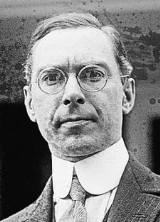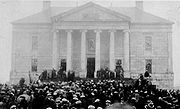
Richard Squires
Encyclopedia
Sir Richard Anderson Squires KCMG (January 18, 1880 – March 26, 1940) was the Prime Minister of Newfoundland
from 1919 to 1923 and from 1928 to 1932.
. He served as a member in the government of Edward Patrick Morris from 1913 to 1918. In 1919, Squires started a campaign for the vacant leadership of the Liberal Party. He won the leadership over William Warren
.
of the Newfoundland People's Party
(later called the Liberal-Labour-Progressive Party). He did this by forming an alliance with the Fisherman's Protective Union of William Coaker
under the name of the Liberal Reform Party.
During his first administration, Squires started the development of the Humber River
. He also attempted many reforms suggested by Coaker. These reforms would have regulated the fishery. These reforms failed because of a collapse in fish prices which was blamed on Coaker's reforms.
was in the center of the scandal. Several other cabinet members demanded Campbell be forced to resign. When Squires refused they said they would walk across the floor. The Attorney General William Warren issued an arrest warrant for Squires. Squires was arrested and later released on bond. He then resigned as Prime Minister.
, as an independent member. In the next year, Newfoundland saw four governments fall. It was not until Walter Monroe
won the 1924 election that stability was restored. Squires remained in the background working on a possible return to power. In 1928 Walter Monroe resigned as Prime Minister and was replaced by his cousin Frederick C. Alderdice
. In the election of 1928, Squires returned as Liberal leader and wiped out the conservatives.
as the first woman to sit in the House of Assembly. However, Newfoundland was struck hard by the Great Depression
; fish prices fell and an already severe public debt worsened. In 1932 Canada refused his request to join the Canadian Confederation
.
Widespread unemployment caused by the Great Depression and allegations of corruption
against Squires and his government along with the government's inability to deal with the economic crisis created widespread discontent and political instability.
In 1932, Squires' finance minister, Peter John Cashin
, resigned from the executive council
accusing his fellow cabinet ministers of widespread corruption and Squires himself of having falsified council minutes to hide the fact that he had been receiving secret payments out of public funds. Cashin's charge inflamed a public which had already been seized by discontent due to the deteriorating economic situation in the province.
On April 5, 1932, a large parade was organized by the opposition. They marched to the Colonial Building
which was the seat of the House of Assembly. There were over 10,000 people at the protest and things got out of control.
 The crowd got angry when no one came out to address them. After a short while, several people managed to break into the building. Squires and government members had to escape around the back. Squires was nearly caught trying to get into a cab; he got away only by running through a house on Colonial Street (near the Colonial Building) to a waiting cab on Bannerman Street.
The crowd got angry when no one came out to address them. After a short while, several people managed to break into the building. Squires and government members had to escape around the back. Squires was nearly caught trying to get into a cab; he got away only by running through a house on Colonial Street (near the Colonial Building) to a waiting cab on Bannerman Street.
.
Squires retired but always remained active in his opposition to the Commission of Government. He died at the age of 60, in 1940.
At the time of his death he was Worshipful Grand Master of the Grand Orange Lodge of British America
, one of the few democratic institutions operating during the Commission of Government period.
Newfoundland and Labrador
Newfoundland and Labrador is the easternmost province of Canada. Situated in the country's Atlantic region, it incorporates the island of Newfoundland and mainland Labrador with a combined area of . As of April 2011, the province's estimated population is 508,400...
from 1919 to 1923 and from 1928 to 1932.
Early career
Squires was born in Harbour Grace, Newfoundland in 1880. He started out practicing law in St. John'sSt. John's, Newfoundland and Labrador
St. John's is the capital and largest city in Newfoundland and Labrador, and is the oldest English-founded city in North America. It is located on the eastern tip of the Avalon Peninsula on the island of Newfoundland. With a population of 192,326 as of July 1, 2010, the St...
. He served as a member in the government of Edward Patrick Morris from 1913 to 1918. In 1919, Squires started a campaign for the vacant leadership of the Liberal Party. He won the leadership over William Warren
William Warren
William Robertson Warren was a Newfoundland lawyer, politician and judge who served as the dominion's Prime Minister from July 1923 to April 1924.-Early life:...
.
Prime minister
Squires won the election of 1919 over Sir Michael CashinMichael Patrick Cashin
Sir Michael Patrick Cashin, KBE was a Newfoundland businessman and politician....
of the Newfoundland People's Party
Newfoundland People's Party
The Newfoundland People's Party was a political party in the Dominion of Newfoundland before it joined Canada.The party was created by Attorney-General Edward Patrick Morris in 1907, when he split from the ruling Liberal Party to found his own political vehicle...
(later called the Liberal-Labour-Progressive Party). He did this by forming an alliance with the Fisherman's Protective Union of William Coaker
William Coaker
Sir William Ford Coaker was a Newfoundland union leader and politician and founder of the Fisherman's Protective Union and the Fishermen's Union Trading Co....
under the name of the Liberal Reform Party.
During his first administration, Squires started the development of the Humber River
Humber River (Newfoundland)
The Humber River is a river in the Canadian province of Newfoundland and Labrador. It is approximately 120 kilometers long, flowing through the Long Range Mountains, southeast then southwest, through Deer Lake, to the Bay of Islands at Corner Brook. It begins near Hampden, Newfoundland. Taylor's...
. He also attempted many reforms suggested by Coaker. These reforms would have regulated the fishery. These reforms failed because of a collapse in fish prices which was blamed on Coaker's reforms.
Fall from power
Squires government was accused of using bribes to win the 1923 General Election. A cabinet minister Dr. Alex A. CampbellAlexander Campbell (Newfoundland politician)
Alexander Campbell was a physician, fox rancher and political figure in Newfoundland. He represented St. John's in the Newfoundland and Labrador House of Assembly from 1928 to 1932....
was in the center of the scandal. Several other cabinet members demanded Campbell be forced to resign. When Squires refused they said they would walk across the floor. The Attorney General William Warren issued an arrest warrant for Squires. Squires was arrested and later released on bond. He then resigned as Prime Minister.
Opposition
Squires remained in the House of AssemblyHouse of Assembly
House of Assembly is a name given to the legislature or lower house of a bicameral parliament. In some countries this may be at a subnational level....
, as an independent member. In the next year, Newfoundland saw four governments fall. It was not until Walter Monroe
Walter Stanley Monroe
Walter Stanley Monroe was a businessman and conservative politician who served as Prime Minister of Newfoundland from 1924 to 1928 as leader of the Liberal-Conservative Progressive Party....
won the 1924 election that stability was restored. Squires remained in the background working on a possible return to power. In 1928 Walter Monroe resigned as Prime Minister and was replaced by his cousin Frederick C. Alderdice
Frederick C. Alderdice
Frederick Charles Alderdice was a businessman, politician and the last Prime Minister of Newfoundland. A prominent St...
. In the election of 1928, Squires returned as Liberal leader and wiped out the conservatives.
Governing in the Depression
His next administration started out well, seeing the election of his wife Helena SquiresHelena Squires
Helena Squires, née Strong was a politician in Newfoundland. She was born in Little Bay Islands.-Biography:Lady Helena E. Squires was born in Little Bay Islands, Newfoundland in 1879...
as the first woman to sit in the House of Assembly. However, Newfoundland was struck hard by the Great Depression
Great Depression
The Great Depression was a severe worldwide economic depression in the decade preceding World War II. The timing of the Great Depression varied across nations, but in most countries it started in about 1929 and lasted until the late 1930s or early 1940s...
; fish prices fell and an already severe public debt worsened. In 1932 Canada refused his request to join the Canadian Confederation
Canadian Confederation
Canadian Confederation was the process by which the federal Dominion of Canada was formed on July 1, 1867. On that day, three British colonies were formed into four Canadian provinces...
.
Widespread unemployment caused by the Great Depression and allegations of corruption
Political corruption
Political corruption is the use of legislated powers by government officials for illegitimate private gain. Misuse of government power for other purposes, such as repression of political opponents and general police brutality, is not considered political corruption. Neither are illegal acts by...
against Squires and his government along with the government's inability to deal with the economic crisis created widespread discontent and political instability.
In 1932, Squires' finance minister, Peter John Cashin
Peter John Cashin
Major Peter John Cashin was a businessman, soldier and politician in Newfoundland and Labrador.-Early life:Cashin, a son of Sir Michael Cashin, joined the Newfoundland Regiment during World War I and ultimately served in command of the British Machine Gun Corp...
, resigned from the executive council
Executive Council (Commonwealth countries)
An Executive Council in Commonwealth constitutional practice based on the Westminster system is a constitutional organ which exercises executive power and advises the governor or governor-general. Executive Councils often make decisions via Orders in Council.Executive Councillors are informally...
accusing his fellow cabinet ministers of widespread corruption and Squires himself of having falsified council minutes to hide the fact that he had been receiving secret payments out of public funds. Cashin's charge inflamed a public which had already been seized by discontent due to the deteriorating economic situation in the province.
On April 5, 1932, a large parade was organized by the opposition. They marched to the Colonial Building
Colonial Building
Colonial Building was the home of the Newfoundland government and the House of Assembly from January 28, 1850 to July 28, 1959. In 1974 it was declared a Provincial Historic Site....
which was the seat of the House of Assembly. There were over 10,000 people at the protest and things got out of control.

Fall from power
Squires had little choice but to dissolve his government and call an election, the result of which was the defeat of the Liberal government and the loss of Squires' own seat. The Liberals won only two seats out of 28. Alderdice, who was still leader of the opposition, came to power and went about putting into place a Commission of GovernmentCommission of Government
The Commission of Government was a non-elected body that governed Newfoundland from 1934 to 1949...
.
Squires retired but always remained active in his opposition to the Commission of Government. He died at the age of 60, in 1940.
At the time of his death he was Worshipful Grand Master of the Grand Orange Lodge of British America
Orange Order in Canada
The Orange Order is a Protestant fraternal organisation based predominantly in Northern Ireland and Scotland, and has lodges in Canada, Australia, New Zealand, Ghana, Togo, the U.S.A, etc..-History:...
, one of the few democratic institutions operating during the Commission of Government period.

